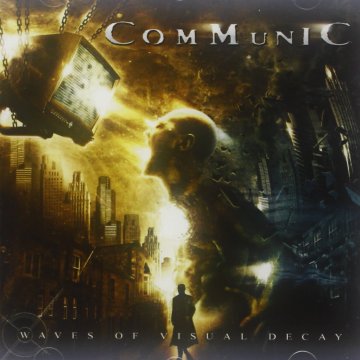Lost in Time: Watchtower – Control and Resistance

Style: progressive thrash metal, technical thrash metal (clean vocals)
Recommended for fans of: Voivod, Crimson Glory, Coroner
Country: United States-TX
Release date: 6 November 1989
The four short years between Energetic Disassembly and Control and Resistance saw a changed progressive metal landscape. No longer were Watchtower alone: Fates Warning and Queensrÿche reigned supreme; USPM bands like Savatage and Crimson Glory picked up some flourishes from the prog thrash world, which, at the time, was being pushed to new levels of instrumental competence—undreamt of five years earlier—by groups like Voivod, Toxik, Coroner, and Death Row. Meanwhile, just eight months earlier, a little band from New York released their debut album When Dream and Day Unite.
Beyond the drastically changed landscape, Watchtower were a new band with guitarist Billy White and vocalist Jason McMaster leaving to pursue other ventures. Alan Tecchio replaced McMaster, and his vocals, if anything, are more polished than McMaster’s while retaining that unhinged energy. The timbre of McMaster is missed, but Tecchio sings his heart out on Control and Resistance with a technical ability and wide range seamlessly fitting the infamous skill of the Watchtower family. More importantly, the man, the myth, the GOD of guitar in progressive metal Ron Jarzombeck joined the fray, a man I consider to be one of metal’s preeminent musical geniuses with his work in acts like Blotted Science and Spastic Ink, his mix of jazzy sounds and serialism techniques unlike anything else in all of metal. And this album right here is where he honed his progressive style. He has a distinct style and tone—nobody else sounds like Ron Jarzombeck with his bright jazzy spring—and it’s clearly at play here, upping the ante for Watchtower from mere technicality to a stunning display of the pinnacle of metal guitar-playing—all several years pre-Images and Words.
The songwriting and production dramatically improved between Energetic Disassembly and Control and Resistance, Watchtower reigning in their talents into a more controlled album. The group winds through seemingly dozens of tempos per song with perfect, stylish instrumental pyrotechnics. The clean bass tone provides the foundation, and then Jarzombek builds towering songs out of power chords, riffs, and crazy, indescribable solos. He does things on a guitar that nobody else that I’m aware of does even thirty-five years later: the break near the middle of “Mayday in Kiev,” for instance, utilizes some classic Jarzombek shenanigans, playing unpredictable notes that allude to his future forays into Serialism. The track’s lyrics meditate on Chernobyl, fitting since these guys were clearly hit by some radioactive amp feedback (à la Peter Parker and his spider) to achieve their superhuman abilities. The precise songwriting works in their favor, too, as Watchtower dazzle on tracks like “The Eldritch” which uses a drum fill to bridge the shreddy intro to the shreddier verse. Longer tracks like the titular “Control and Resistance” have clearer sections than songs on Energetic Disassembly had, switching from intro chords to thrash metal insanity with finesse that the unwieldy debut songs lacked. Across the album, the interplay between Keyser’s bass and Jarzombeck’s guitar is spot-on, the two soloing and riffing start-and-stop time-signature freakouts as if they’re an extension of each other’s brain and fingers from the first moments of “Instruments of Random Murder” to the last of “Dangerous Toy.” The biggest difference between the two albums is Jarzombeck’s increased propensity for soloing compared to White, and Watchtower benefited from it.
Control and Resistance is a display of talent that, while not as important as Disassembly, is much more refined, cementing Watchtower’s legacy in progressive metal (and kickstarting the career of Jarzombek who has brought a range of new techniques to metal thanks to his nearly unmatched creativity). I’m still blown away by these Texans’ talent and vision in the present day; I don’t know many riffs that can rival the likes of 3:10 in “Hidden Instincts” or 3:10 in “Dangerous Toy” for their sheer swagger. Watchtower were frantically riffing circles around everyone else, in weird time signatures, too, and they knew it.
For those of you still doubting their importance, the following bands have cited direct influence from the classic band: Testament, Dream Theater, Death, Annihilator, Coroner, Atheist, Pestilence, Cynic, Symphony X, Devin Townsend, Toxik, Sieges Even, and Spiral Architect. With only two albums to their name, they managed to birth a genre and influence all your favorite bands. Of course, groups like Fates Warning were right in line and metal was on the brink of its technical and progressive breakthrough, but Watchtower did it first and, importantly, as well. Respect your ancestors and check out these legendary albums.
Recommended tracks: Instruments of Random Murder, The Eldritch, Mayday in Kiev, Control and Resistance
You may also like: Toxik, Blotted Science, Deathrow, Spiral Architect, Howling Sycamore, Dissimulator
Related links: Spotify | Official Website | Facebook | Instagram | Metal-Archives page
Label: Noise Records
Watchtower was:
– Alan Tecchio (vocals)
– Ron Jarzombek (guitars)
– Doug Keyser (bass)
– Rick Colaluca (drums)



2 Comments
Review: Krateros - Lost in Translation - The Progressive Subway · February 14, 2026 at 10:00 AM
[…] tracks: Linguicide, Uticensis, Comatose WaltzYou may also like: Transilience, Watchtower, Hesken, ExxûlFinal verdict: […]
Review: Coroner - Dissonance Theory - The Progressive Subway · October 20, 2025 at 2:00 PM
[…] tracks: Consequence, Symmetry, The Law, Trinity, RenewalYou may also like: Watchtower, Toxik, Xoth, Anarchÿ, Cryptosis, BlasteroidFinal verdict: […]